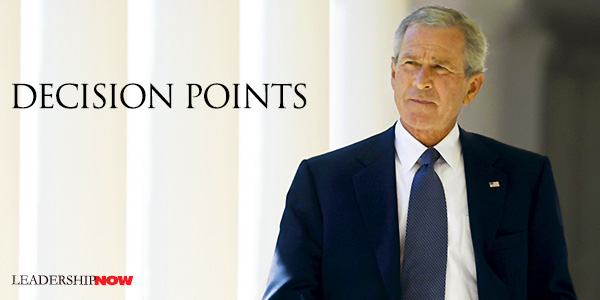 |
 |
11.16.10

Decision Points
LEADERSHIP matters because we have choices. Leaders expose our choices and provide depth to our horizons. It is fitting that President George W. Bush’s book is about choices. The world changed after 9/11 and became increasingly uncertain and lacking precedent. While not intended to be an exhaustive biography, Decision Points does describe what it was like for George W. Bush to serve as president. More importantly, it is an account relating how he made the key decisions he made during his presidency. He writes, “Throughout the book, I describe the options I weighed and the principles I followed. I hope this book will give you a better sense of why I made the decisions I did. Perhaps it will even prove useful as you make choices in your own life.” Whether you agreed with him or not, it is enlightening to see the issues from his point of view. A point of view most of us will never have. It reminds me of a line from the TV series 24 by Noah Daniels the acting President of the United States, “You know Tom, it’s easy to think you’ve got all the answers when none of the ultimate responsibility lies with you. But sittin’ in this chair.… Until you sit in this chair, you don’t know anything.” President Bush covers among other things, in nearly 500 pages, the decision to quit drinking, stem cell research, 9/11, Afghanistan, Iraq, the Surge, counterterrorism programs, Katrina, his freedom agenda, and the financial crisis. Reflecting on his eight years, he writes, “After the nightmare of September 11, America went seven and a half years without another successful terrorist attack on our soil. If I had to summarize my most meaningful accomplishment as president in one sentence, that would be it.”Here are several excerpts: • In the presidency, there are no do-overs. You have to do what you believe is right and accept the consequences. • Quitting drinking was one of the toughest decisions I ever made. Without it, none of the others that follow in this book would have been possible. Yet without the experiences of my first forty years, quitting drinking would not have been possible either. • The summer of 2006 was the worst period of my presidency. I thought about the war constantly. … Most of all, I thought about our troops. I tried to imagine how it would feel to be a twenty-year-old on the front lines, or a military mom worrying about her son or daughter. The last thing they needed to hear was the commander in chief whining about how conflicted he felt. • One of my favorite books is the fine historian David McCullough’s biography of President Harry Truman. I admired Truman’s toughness, principle and strategic vision. “I felt like the moon, the stars, and all of the planets had fallen on me,” he said when he took office suddenly in the final months of World War II. Yet the man from Missouri knew how to make a hard decision and stick by it. He did what he thought was right and didn’t care much what the critics said. • That is the nature of the presidency. Perceptions are shaped by the clarity of hindsight. In the moment of decision, you don’t have that advantage. • One of the lessons I took from [Theodore] Roosevelt and Reagan was to lead the public, not chase the opinion polls. I decided to push for sweeping reforms, not tinker with the status quo. • Self-pity is a pathetic quality in a leader. It sends such demoralizing signals to the team and the country. …In the presidency, as in life, you have to play the hand you’re dealt. • The nature of the presidency is that sometimes you don’t choose which challenges come to your desk. You do decide how to respond. … As I hope I’ve made clear, I believe I got some of those decisions right, and I got some wrong. But on every one, I did what I believed was in the best interests of our country. Regarding Iraq, Bush writes, “Years from now, historians may look back and see the surge as a foregone conclusion, an inevitable bridge between the years of violence that followed liberation and the democracy that emerged. Nothing about the surge felt inevitable at the time.” It’s easy to overlook the thought that lead to the decisions made. Of Related Interest: 
Posted by Michael McKinney at 02:12 AM
|
BUILD YOUR KNOWLEDGE
 

How to Do Your Start-Up Right STRAIGHT TALK FOR START-UPS 
Grow Your Leadership Skills NEW AND UPCOMING LEADERSHIP BOOKS 
Leadership Minute BITE-SIZE CONCEPTS YOU CAN CHEW ON 
Classic Leadership Books BOOKS TO READ BEFORE YOU LEAD |